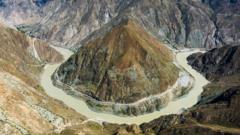A proposed dam in Tibet has sparked rare protests, resulting in a harsh crackdown marked by arrests and violence. As construction plans advance, Tibetans express fear for their cultural heritage and livelihoods.
Tibetan Protests Erupt Over Controversial Dam Project Amid Crackdown

Tibetan Protests Erupt Over Controversial Dam Project Amid Crackdown
Recent protests in Tibet against a Chinese dam have led to violent crackdowns, highlighting ongoing tensions between Tibetan residents and Chinese authorities.
In the wake of Beijing's plans to construct a massive dam on the Jinsha River within Tibetan territories, a wave of protests erupted among the Tibetan population earlier this year, prompting a violent response from authorities. Reports reveal that hundreds of Tibetans were rounded up during a crackdown, with many facing severe beatings and injuries, as confirmed by the BBC through eyewitness accounts and verified footage.
Protests are a rare occurrence in Tibet, a region long subjected to strict Chinese control since its annexation in the 1950s. However, the prospect of the Gangtuo dam—also known as Kamtok—has ignited unrest, illustrating the community's deep concerns about the impact on their culture and environment. The dam's reservoir threatens to drown areas of significant cultural and religious importance, including ancient monasteries and sacred relics.
Claims of police brutality and detentions came to light shortly after the protests in February. Coverage from the BBC chronicles the challenges faced by Tibetan sources, who spoke out despite the risks of government retaliation. Footage reveals mass gatherings, where protestors vocally opposed the planned evictions linked to the dam construction.
The Gangtuo dam, located in Sichuan province, has been a longstanding project approved back in 2012. Concerns raised in a letter from UN rapporteurs point to the lack of meaningful consultation with affected residents, who were inadequately informed about the project's implications. A public tender seen by the BBC outlines plans to displace over 4,200 residents, further intensifying community anxieties about losing their homes.
In the immediate aftermath, authorities implemented strict bans on communications and increased surveillance on the Tibetan population, heightening fears among residents about potential reprisals. Reports of physical abuse during interrogations paint a grim picture of the risks faced by those speaking against the government's development projects.
China's narrative highlights the need for development through clean energy projects, yet rights activists argue it is part of a broader strategy to exploit Tibetan resources while undermining local cultures. The dam, part of a larger initiative to create a series of hydroelectric projects in the region, has sparked outrage over human rights abuses, with claims that it exacerbates cultural erasure.
As construction efforts remain uncertain, community members appeal for an end to the dam project, fearing for the future of their ancestral lands. The BBC's investigation underscores the urgency of the situation in Tibet and calls into question the ethical considerations behind China's ongoing development strategies in sensitive areas.




















